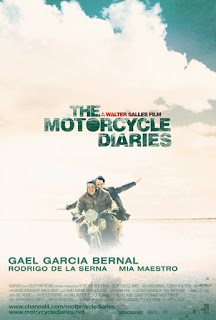In January 1952, two young men from Buenos Aires went on an immense road trip on their motorbike 'La Poderosa' with the idea that they would explore as much of the continent as they could. One of these two men would become the face of the Cuban revolution. His name was Ernesto 'Che' Guevara.
The Motorcyle Diaries, Guevara's diary kept on this lengthy journey, takes him across the continent as he meets people of all cultures and classes, sleeps on floors, struggles to find shelter, food and transport. More fascinating than all of this, though, is Guevara's search for purpose, his search for meaning.
The diaries are written eight years before the Cuban revolution but this is when Guevara's sense of injustice began, it seems. Alongside friend and travel companion, Alberto Granado, the diaries show the major class differences across the continent, the feelings toward those indigenous populations who are judged to be inferior by so many and the lengths many go to just to provide for their families - the section where the pair meet people waiting for work at a mine is particularly upsetting. The work is extremely dangerous and the pay is ridiculously low. But, sadly, these people have no alternatives.
On the journey, both Guevara's and Granado's eyes are opened to the world around them. They have led fairly middle-class 'normal' lives in Argentina, studying and socialising - so this is the first time they really experience the world beyond that to which they have become accustomed. They use their trainee medical skills to get letters of recommendations from doctors and medical staff. They stay at leper colonies and meet those unable to get medical attention. Mirroring this, Guevara himself struggles with his severe Asthma - which on occasion grounds him for days on end. The pair are shown great hospitality and care by some but are also scorned and rejected by others.
As well as meeting people from all walks of life on their journey, the pair also experience all the highs and lows of mother nature and witness some stunning, breathtaking sights along the way. Guevara is an incredibly evocative writer, even here in his diary, as he describes in great detail not just what he is seeing but the impact such sites have on him. His reaction when they arrive at Machu Picchu is intoxicating.
The book is relatively short, with a forward written by Guevara's daughter Aleida Guevara March and a chronology of his life. It is choppy to say the least, but this is to be expected from a diary.
The film, on the other hand, is compelling from start to finish and flows with stunning beauty, thanks to two incredible leads, stunning landscapes and flawless directing from Walter Salles (who recently directed another coming-of-age road movie 'On the Road'). Gael Garcia Bernal is perfectly cast as the young idealist Guevara and pulls off a performance all the more powerful for its subtlety and control. Rodrigo De la Serna also captures all the passion and humour of Granado. Salles has strayed slightly away from the overly political elements of the text, allowing the experiences to speak for themselves and affect audiences as much as they do Guevara and Granado.
The Motorcycle Diaries is a fine example of taking a powerful, evocative text and making a simply stunning film that conveys to audiences what the text can only imply.
Book - 4/5 FOBLES
Film - 5/5 FOBLES



ReplyDeleteIf you have/haven't seen the movie of this book and enjoy roadtrips, this book definitely for you! The experiences, sceneries and emotions have been described beautifully. One can see the character building up in a young Che Guevara and the environment around him that enables him to be a leader for the revolution.
A brilliant book that can be read over again!